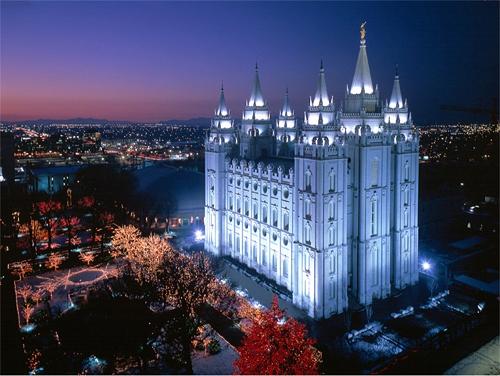 Baptism is an ordinance required for salvation. An ordinance is an outward sign of an inward commitment to Christ. Not all baptisms are equal, however. To be a valid ordinance in The Church of Jesus Christ of Latter-day Saints (commonly referred to as the Mormon Church), baptism must be performed by an authorized agent of God, in the manner He prescribes. Mormons believe that the Savior restored His authority or priesthood to the earth through personal ministrations of John the Baptist and Peter, James, and John. The authority of God rests with worthy male members of the Church who may baptize in the Savior’s name. No other baptisms are recognizable by God or by the Church.
Baptism is an ordinance required for salvation. An ordinance is an outward sign of an inward commitment to Christ. Not all baptisms are equal, however. To be a valid ordinance in The Church of Jesus Christ of Latter-day Saints (commonly referred to as the Mormon Church), baptism must be performed by an authorized agent of God, in the manner He prescribes. Mormons believe that the Savior restored His authority or priesthood to the earth through personal ministrations of John the Baptist and Peter, James, and John. The authority of God rests with worthy male members of the Church who may baptize in the Savior’s name. No other baptisms are recognizable by God or by the Church.
In addition to providing a way for every living soul to enter His kingdom, the Savior provided a way for those who died without gospel knowledge, to be saved. Through Joseph Smith, the founder of Mormonism, the doctrine of baptism for the dead was restored to the earth. This doctrine means that living members of the Church can be baptized on the behalf of the dead who never received baptism by authorized ministers. So, people who died without learning the Gospel on earth have an opportunity to accept it in the spirit world, the place where they reside while awaiting the resurrection. Acceptance of this ordinance remains an opportunity and a choice for those so served. They still have their agency to accept or reject this ordinance.
The only place that a baptism for the dead can be performed is inside a Mormon temple. A special baptismal font is provided to perform the baptism—the font is always placed on a sculpture of twelve oxen, which represent the twelve tribes of Israel.
 In Mormon belief, the original Church that Christ set up on the earth also practiced baptism for the dead. As it says in 1 Corinthians 15:29, “Else what shall they do which are baptized for the dead, if the dead rise not at all? why are they then baptized for the dead? ” This reference to baptism of the dead was made in a letter, which would seem to indicate that this doctrine was commonplace and did not need to be explained; interestingly, resurrection seems to be the doctrine in question here. But Mormon doctrine does indeed profess both doctrines—resurrection and baptism for the dead. They believe that God cares about all His children, not just those that circumstance allowed to hear the Gospel. After all, isn’t He the God of both living and dead?
In Mormon belief, the original Church that Christ set up on the earth also practiced baptism for the dead. As it says in 1 Corinthians 15:29, “Else what shall they do which are baptized for the dead, if the dead rise not at all? why are they then baptized for the dead? ” This reference to baptism of the dead was made in a letter, which would seem to indicate that this doctrine was commonplace and did not need to be explained; interestingly, resurrection seems to be the doctrine in question here. But Mormon doctrine does indeed profess both doctrines—resurrection and baptism for the dead. They believe that God cares about all His children, not just those that circumstance allowed to hear the Gospel. After all, isn’t He the God of both living and dead?
Peter tells us in 1 Peter 3: 18-20, that the Lord “also . . . went and preached unto the spirits in prison.” Jesus, therefore, would seem to have been very concerned about the salvation of the souls that had already left the world. Why else would He preach to those in [spirit] prison? Peter further states, in 1 Peter 4:6, “For this cause was the gospel preached also to them that are dead, that they might be judged according to men in the flesh, but live according to God in the spirit.” God is a just God, but also a merciful one. The spirits in prison would not escape judgment for how they lived, but God would bestow the gospel upon them. In that first set of scriptures, 1 Peter 3: 18-20, we see that at least some of the spirits in prison were people who had died in the great flood that only Noah and his family escaped from. Jesus, therefore, did preach to the openly wicked as well as those who might not have been—he preached to those who, when they lived, had been destroyed because of their sin. Their sin never provoked His abandonment.
Those who profess Mormonism also profess to follow Jesus Christ and strive to be like him. So, as he was concerned with the dead, likewise, we should be concerned about the welfare of all those in our families, not just those currently living.
